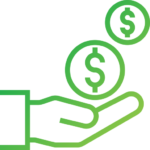What is debt consolidation?
Debt consolidation is a process of taking out one loan to pay off multiple debts. This can be done by taking out a personal loan, using a balance transfer credit card, or getting a home equity loan.
The goal of debt consolidation is to save money on interest and make it easier to pay off your debt. When you consolidate your debts, you’re essentially combining all of your outstanding debts into one single loan. This can help you save money on interest because you’ll only have to pay interest on one loan instead of multiple loans.

How Does Debt Consolidation Work?
There are several different ways to consolidate your debts, such as:
 Personal Loans
Personal Loans
The most common way is to take out a personal loan from a lending institution. You can use the loan to pay off all of your outstanding debts, which will leave you with one monthly payment to make.
 Balance Transfer Credit Card
Balance Transfer Credit Card
This involves transferring the balances of your other credit cards onto one credit card. This can help you save money on interest because balance transfer cards usually have lower interest rates than other types of credit cards.
 Home Equity Loans
Home Equity Loans
This is a loan that’s secured by the equity in your home. Home equity loans usually have lower interest rates than unsecured loans, so this can be a good option if you’re looking to save money on interest.
 Get debt consolidation serviced
Get debt consolidation serviced
These companies will work with you to consolidate your debts into one monthly payment. They may also negotiate with your creditors to get lower interest rates or waive certain fees.
Drowning from multiple debts? Centennial Funding is ready to help you.
How Does Debt Consolidation Work?
To qualify for a consolidation loan, you’ll need to have:
A good credit score and a steady income.
A good credit score is important because it will help you secure a lower interest rate on your consolidation loan. A lower interest rate means you’ll save money over the life of the loan. A consolidation loan with a higher interest rate will still help you save money by consolidating your debt into one monthly payment, but it will take longer to pay off the loan.


Prove that you have enough equity in your home to get a home equity loan or line of credit.
You’ll also need to have a steady income to qualify for a consolidation loan. Lenders want to see that you have a reliable source of income so they know you’ll be able to make your monthly payments. If you don’t have a steady income, you may still be able to qualify for a consolidation loan if you can prove that you have enough equity in your home or another asset.
Prove you are qualified for a personal loan from a bank or credit union.
A personal loan from a bank or credit union will usually have a lower interest rate than a consolidation loan from a private lender. To qualify for a personal loan, you’ll need to have good credit and prove that you can repay the loan. You may also need to provide collateral, such as your car or home, to get a personal loan.


Consolidate your debts with a balance transfer credit card.
A balance transfer credit card can help you consolidate your debt into one monthly payment. To qualify for a balance transfer credit card, you’ll need to have good credit and be able to prove that you can repay the debt. You’ll also need to have enough available credit on the card to cover the amount of debt you want to transfer.
If you have bad credit, there are still options available to consolidate your debt, but they may come with higher interest rates and fees. You can try to get a secured loan from a lender, use a co-signer, or look into peer-to-peer lending.
At Centennial Funding, we will help you achieve your dream.
What are The Advantages and Disadvantages of Debt Consolidation?
There both advantages and disadvantages in getting a debt consolidation.
Advantages:
![]() It streamlines your financial obligations by bringing all your debts into one place, making it easier to keep track of.
It streamlines your financial obligations by bringing all your debts into one place, making it easier to keep track of.
![]() It can save you money on interest because you’ll be taking out one loan with a lower interest rate to pay off multiple debts.
It can save you money on interest because you’ll be taking out one loan with a lower interest rate to pay off multiple debts.
![]() It can help improve your credit score if you’re able to get a lower interest rate and make timely payments on the consolidation loan.
It can help improve your credit score if you’re able to get a lower interest rate and make timely payments on the consolidation loan.
![]() It accelerates payoffs by getting rid of high-interest debt so you can focus on paying off your debt consolidation loan.
It accelerates payoffs by getting rid of high-interest debt so you can focus on paying off your debt consolidation loan.
![]() It reduces monthly payments by giving you more time to repay the loan.
It reduces monthly payments by giving you more time to repay the loan.
Disadvantages:
![]() You could end up paying more interest in the long run if you extend the life of the loan.
You could end up paying more interest in the long run if you extend the life of the loan.
![]() There’s a risk that you could damage your credit score if you miss payments on the consolidation loan or run up your balances on your credit cards again.
There’s a risk that you could damage your credit score if you miss payments on the consolidation loan or run up your balances on your credit cards again.
![]() You may not be eligible for a debt consolidation loan if you have bad credit.
You may not be eligible for a debt consolidation loan if you have bad credit.
![]() You’ll need to be disciplined with your spending to make debt consolidation work because it will only work if you don’t end up taking on more debt.
You’ll need to be disciplined with your spending to make debt consolidation work because it will only work if you don’t end up taking on more debt.
It’s important to compare different options before choosing a debt consolidation method to make sure that it’s the right choice for you. You should also make sure that you’re able to make the monthly payments on the consolidation loan and that you’re comfortable with the terms.
How to Get a Debt Consolidation Loan
If you’re considering debt consolidation, there are a few steps you’ll need to take to get a consolidation loan.
1 Check your credit score and credit reports to make sure there are no errors that could hurt your chances of getting approved for a loan.
2 Shop around for the best interest rates and terms.
3 Compare different types of loans to find the right one for you.
4 Apply for the loan and wait for approval.
5 Once you’re approved, use the loan to pay off your debts and close your accounts.
6 Make timely payments on the consolidation loan to improve your credit score.

FAQ’S
Will debt consolidation help my credit?
If you’re able to get a lower interest rate and make timely payments on the consolidation loan, it could help improve your credit score. There’s a risk that you could damage your credit score if you miss payments on the consolidation loan or run up your balances on your credit cards again.
Do debt consolidation loans hurt your credit?
If you’re able to get a lower interest rate and make timely payments on the consolidation loan, it could help improve your credit score. There’s a risk that you could damage your credit score if you miss payments on the consolidation loan or run up your balances on your credit cards again.
Requirements for Debt Consolidation
To be eligible for debt consolidation, you’ll need to have a good credit score and a steady income. You’ll also need to be able to prove that you can afford the monthly payments on the consolidation loan.
The requirements are normally not as stringent for debt consolidation loans as they are for other types of loans, but you’ll still need to make sure that you meet the requirements before you apply.
Is Debt Consolidation a Good Idea?
Debt consolidation can be a good idea if you’re able to get a lower interest rate and you’re comfortable with the terms. It’s important to compare different options before choosing a debt consolidation method to make sure that it’s the right choice for you.

Simple Plans

Quick Approvals

No Prepayment Penalties

